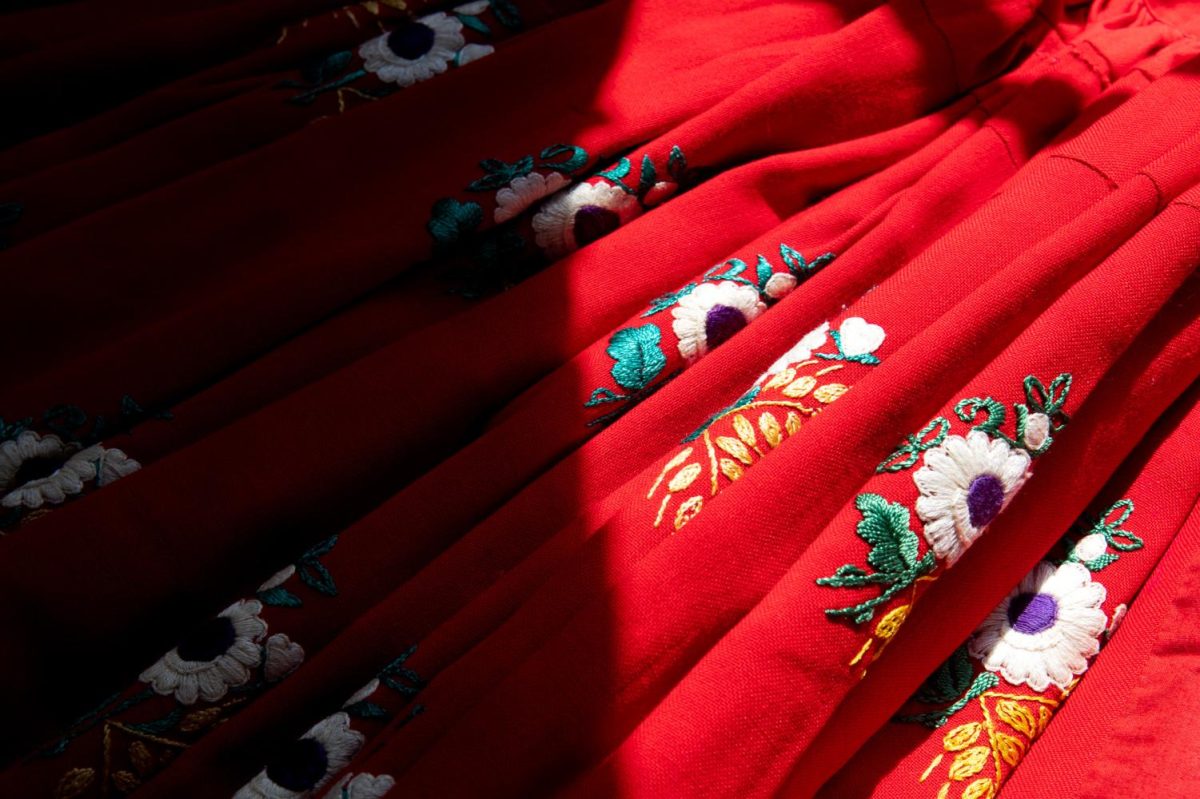The Slovak Film Festival came to an end on Sunday, Nov. 26, with a screening of the historical drama “The Confidant.” The three-part series of film screenings was a collaboration of Pitt’s Department of Slavic Languages and Literature, Pitt’s European Studies Center, the Western Pennsylvania Slovak Cultural Association and the Embassy of the Slovak Republic in Washington, D.C. The final screening, which was free to the public, took place in the Frick Fine Arts building.
Due to technical difficulties, the attendees relocated from the auditorium to a smaller upstairs classroom. Having to swap cushioned, upholstered seating for hard, plastic chairs did not stop attendees from enjoying the free snacks or gleefully greeting each other. English and Slovak filled the room, as did infrequent crinkling of chip bags and the film’s unexpected commercial breaks, prompting good-natured groans.
“The Confidant,” a 2012 film in Czech and Slovak, follows a young couple, Adam and Eva, as they deal with the implications of Adam’s state surveillance job in a totalitarian Slovakia. Joseph Senko, the executive director of the WPSCA, said the Slovak Film Festival is just one of the Slovak cultural events they put on for Pittsburgh’s Slovak community.
“The Western Pennsylvania Slovak Cultural Association has events every month. Once a year we have movies at the University of Pittsburgh — Slovak movies [with] English subtitles — and we have Slovak wine tasting [and] Slovak beer tasting,” Senko said. “[They are] unique events for people of Slovak culture to get familiar with Slovak events.”
Senko said they’ve started screening more current films at the festival this year, but they haven’t reached pre-pandemic attendance.
“This year we have more current movies, before we had older movies,” Senko said. “[When] we used to have — before COVID, over at Posvar Hall — old movies, we’d get about 30, 35 [people]. Here, it’s a beautiful auditorium, [and] current movies, but I don’t know if we’re competing with the cold weather or the Steelers, but we only have 15.”
By the time the film ended, and latecomers had slipped quietly into backrow seats, a total of 20 people were in attendance.
Abby Kraus, a Pitt junior biological sciences major and Slovak Studies minor, said the festival helped her understand what life during Czechoslovakia’s communist regime was like for her family and even her professors.
“This [festival] involves more either modern day films, or films that are made nowadays, and deal with the history of what my family living in Slovakia had to deal with during the communist regime, or what some of my professors even went through,” Kraus said.
Kraus said she connects with her Slovakian heritage through events like the Slovak Film Festival, and she pursues and leads Slovak events at Pitt as a result.
“I’m Slovak on both halves of my family,” Kraus said. “I’ve become the president of the Slovak Club here [at Pitt], I’m the coordinator for the Slovak Heritage Festival now, and it’s really led to some great opportunities with me interacting with the community, but also even getting to study abroad, learn the language my aunts spoke around me, and just learn more about my heritage.”
Despite taking place on Pitt’s campus, mostly seniors attended the festival, not students. The attendees’ decades of first-hand experience created an environment of shared cultural understanding. Their familiarity with Slovakia during the communist regime was apparent in their reactions to lines in the film. Sometimes they would laugh with understanding, sometimes with empathy, and other times not at all. In the absence of audible reactions, attendees nodded their heads emphatically, and at times morosely. Though aspects of the film veered toward fiction, the larger themes of fear and totalitarianism represented on screen were very real and hit home for some at the festival.
Albina Senko, who serves on the WPSCA’s board of advisors, had first hand experience with totalitarianism in relation to Slovakia. She watched the film from the front row and afterwards said she enjoyed the film since it spoke to her personal experience.
“I came from Slovakia right at the end of WWII,” Senko said. “So [the film] was very nice.”
The Slovak Film Festival reflected on those stories of the past while highlighting their relevance in the present. Kraus said the festival goes beyond a rudimentary historical understanding by showing films that elucidate the continuous effects of communism in Eastern Europe.
“I think a lot of people don’t realize the impact nowadays that the Soviet Union had on its citizens,” Kraus said. “So some of these movies really reveal a lot of what happened back then, but also it shows the culture of Slovakia now and how it’s been impacted, and how the people have been impacted by those times.”


